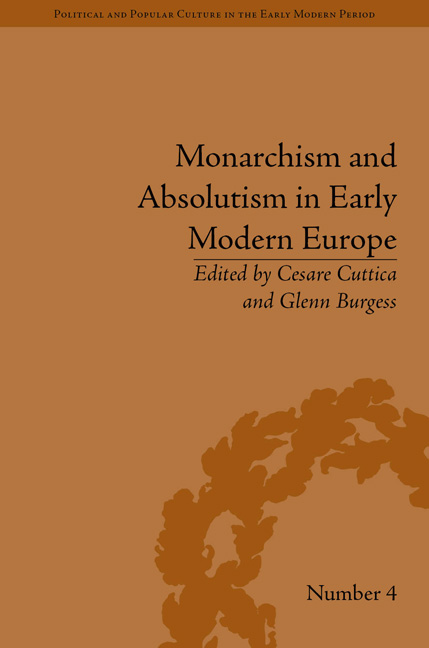Book contents
- Frontmatter
- CONTENTS
- Acknowledgements
- List of Contributors
- Introduction: Monarchism and Absolutism in Early Modern Europe
- Part I Royalists, Republicans, Patriarchalists: English Thinkers at Odds in the Seventeenth Century
- Part II Absolutism, Cynicism, Patriotism: Eighteenth-Century Enlightenment Reflections
- Part III Absolutism, Monarchism, Despotism in Theory and Practice: Contested Historiography and Comparative Approach
- Part IV Monarchy, the State of Nature, Religion and Iconography in European Perspective
- 11 ‘Monstrous’ Pufendorf: Sovereignty and System in the Dissertations
- 12 Absolute Chaos, Absolute Order: The Rhetoric of the State of Nature in the Discourse of Sovereignty
- 13 Bayle on Brutus: A Paradoxical Issue?
- 14 ‘More Long-Lasting Than Bronze?’ Statues, Public Commemoration and Representations of Monarchy in Diderot's Political Thought
- Notes
- Works Cited
- Index
11 - ‘Monstrous’ Pufendorf: Sovereignty and System in the Dissertations
from Part IV - Monarchy, the State of Nature, Religion and Iconography in European Perspective
- Frontmatter
- CONTENTS
- Acknowledgements
- List of Contributors
- Introduction: Monarchism and Absolutism in Early Modern Europe
- Part I Royalists, Republicans, Patriarchalists: English Thinkers at Odds in the Seventeenth Century
- Part II Absolutism, Cynicism, Patriotism: Eighteenth-Century Enlightenment Reflections
- Part III Absolutism, Monarchism, Despotism in Theory and Practice: Contested Historiography and Comparative Approach
- Part IV Monarchy, the State of Nature, Religion and Iconography in European Perspective
- 11 ‘Monstrous’ Pufendorf: Sovereignty and System in the Dissertations
- 12 Absolute Chaos, Absolute Order: The Rhetoric of the State of Nature in the Discourse of Sovereignty
- 13 Bayle on Brutus: A Paradoxical Issue?
- 14 ‘More Long-Lasting Than Bronze?’ Statues, Public Commemoration and Representations of Monarchy in Diderot's Political Thought
- Notes
- Works Cited
- Index
Summary
Prologue
Recent decades have begun to contest the language of ‘absolutism’ as a useful descriptor of early modern political structures, not only because of its diverse usage but also its lack of clear and uncontroversial referents.3 Less noticeably, perhaps, this challenge has also undermined the counterpart language of ‘democracy’ or ‘republicanism’ (Castiglione's ‘ghost’ – in the volume's introduction), whose historical and theoretical ascendancy rests on an implied contrast with absolutism (especially its monarchist forms). Defences of the term by specification or restriction – such as Marxist, class-based analyses which note the interdependence of monarchical and aristocratic elements in society (in contrast to lower echelons), and discussions emphasizing the external relations of states – merely elaborate the problem. For ‘popular’ governments, too, may embody oppressive class relations and abuse power, and ‘republican’ states can be as ‘absolutist’ or hegemonic in their foreign policy as any other. This suggests that the opposition assumed in such discussions is misconceived.
This chapter supports this claim through an analysis of Samuel Pufendorf 's (1632–94) theory of the state. Pufendorf is an apt figure for the argument given his reputation – like Hobbes, whose disciple he has been called – as an early modern absolutist and sovereignty theorist emphasizing strong and unified political authority. He is equally relevant, however, albeit less familiar, because of his flexibility regarding alternative constitutional forms wherein sovereignty can be exercised, and his sensitivity toward contextual factors determining the appropriateness of concrete political solutions.
- Type
- Chapter
- Information
- Monarchism and Absolutism in Early Modern Europe , pp. 159 - 176Publisher: Pickering & ChattoFirst published in: 2014



